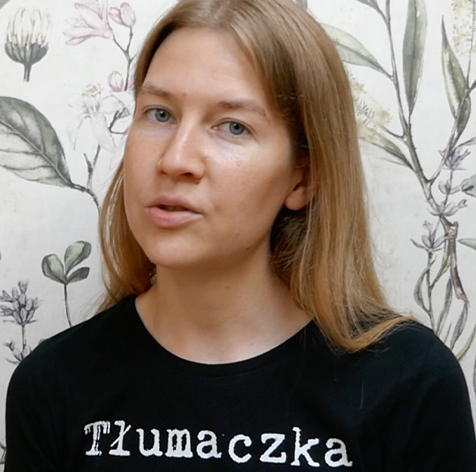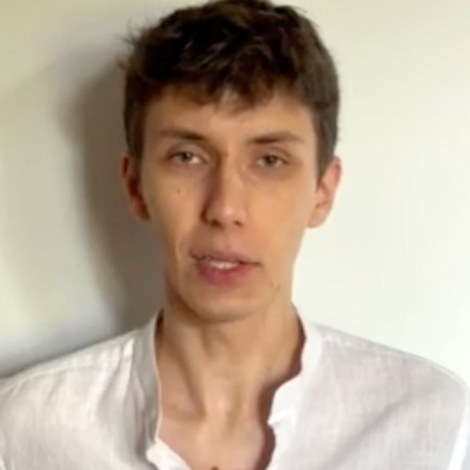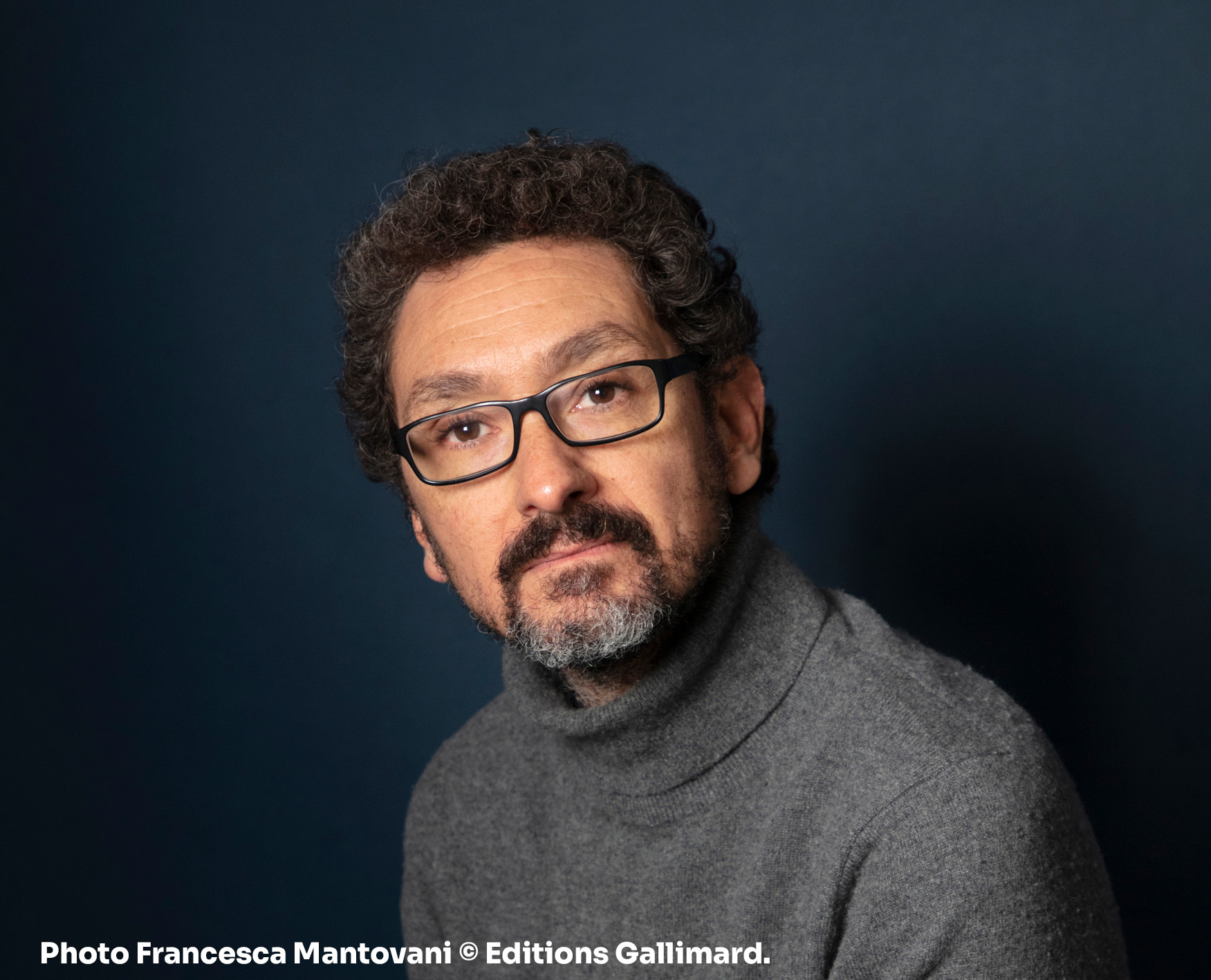Numéro deux David Foenkinos

“Numéro deux” by David Foenkinos was published as part of the "Translation Tandems" project, funded by the programme “Creative Europe Programme. Circulation of European literary works and literary translations”. The main character, Martin Hill, accompanies his father on a film set and is noticed by a producer who is preparing the first film in the Harry Potter series. He goes through various stages of casting, but in the final round, the second finalist gets the main role. Martin's future is marked by the release dates of subsequent films and their spectacular success, which he could have been a part of.
While translating “Numéro deux”, Aleksandra Weksej (mentor) and Karol Buda (mentee) worked together. More information about the translators can be found in their biographies andi videos . featuring them.
In collaboration with the translators, publishing house Grupa Wydawnicza Relacja has prepared additional materials on the e cultural references, in the book, providing a broader presentation of the author and explaining the circumstances of the novel's creation. The materials also describe interesting Polish themes that appear in the plot.

Aleksandra Weksej
The translator of various literature from French and English, a member of the Association of Literature Translators. She graduated in Applied Linguistics from the University of Warsaw and completed postgraduate studies in literary translation at the Jagiellonian University. She has been translating books since 2013 and has authored over 30 translations. Her greatest pleasure is translating interesting contemporary prose and stories for children, spending her free time with her husband and daughters or in the mountains and in books. She seeks inspiration and explores botanical themes in literature. Weksej is a mentor in the "Tandemy "Translation Tandems" program.

Karol Buda
Winner of a competition and mentee in the "Translation Tandems" program. He debuts as a translator with the translation of “Numéro deux”. Currently studies Romance philology with a translation module at the University of Warsaw. He is interested in cinema and sports.

What you didn't know about the life of David Foenkinos, the author of “Numéro deux”?
David Foenkinos, born in 1974 in Paris, is a French writer, screenwriter, director, and one of the most widely read authors in France.
His life journey is full of inspiring twists. Today known as the author of bestsellers like “Numéro deux” and “Delicacy”, his beginnings were far from glory.
Not everyone is born with a pen in hand. Sometimes life's twists and turns shape us in unpredictable ways. David Foenkinos discovered his love for literature and art when his health failed him. At the age of 16, he experienced a serious illness and had to undergo urgent heart surgery, which landed him in the hospital for several months. Lying in a hospital bed, he started devouring books – it was during this time that his passion for writing was born. All of his literary works reflect what he went through during his hospitalization. The theme of death and second chances became a central element of his work. His books reflect the struggle with fate, rebuilding, and survival.
The road to fame is not always paved with roses. Foenkinos knows this well, as he himself had to go through many difficulties before gaining recognition as a writer. His first attempts to publish a book were met with rejection. His literary debut, the novel "Inversion de l'idiotie. De l'influence de deus Polonais", was rejected by publishers until Gallimard had decided to publish it. In subsequent years, more of his books saw the light of day, but Foenkinos remained in the shadows. His writing career gained momentum only with the novel "Delicacy".
The experience of being unnoticed, known firsthand by Foenkinos, is perfectly evident in “Numéro deux”. In an article for "Le Monde", Foenkinos recounts that he came up with the idea for the book while reading an article about the genesis of the Harry Potter film. It brought to mind hundreds of actors who auditioned for the leading role, until there were only two left. One of the casting directors explained in an interview with "The Huffington Post": "We chose Daniel Radcliffe because he had that special something". Foenkinos then became obsessed with imagining the fate of that second person, because to pass by the icon of mass culture is physically impossible.
The author does not limit himself to literature alone. He successfully navigates both the world of books and cinema. His novel "Delicacy", which captured the hearts of readers, was adapted into a film in 2011. Foenkinos not only wrote the screenplay but also co-directed it with his brother Stéphane. He is well versed in the film industry, which is also evident in “Numéro deux". This is not the only case where his books have been adapted into films. Films such as “Jalouse” (2017), “Lola et ses frères” (2018), and “Le Mystère Henri Pick” (2019) have gained recognition not only nationally but also internationally, including in Poland.

Film references in “Numéro deux”
In "Numéro deux" there are numerous references to both French and international cinema.
In the book, you can find more or less recognizable titles and names of people known from the world of film. Some of them say a little more to an average French reader than to a Polish one. The presence of these numerous references does not come out of nowhere, as David Foenkinos, as a director and screenwriter, is strongly connected to the film industry. By introducing us to the story of Martin Hill and his (almost) success, the author brings the reader closer to the world of cinema behind the scenes. Film titles also appear in the dialogues of the characters, and the main character himself expresses his fascination with David Lynch's early productions. We have prepared a list of film titles and names that are mentioned in Foenkinos' novel. Do you know them all?
“Baisers volés”, dir. François Truffaut
This is a French film from 1968 that tells the story of Antoine Doinel, a character known from the director's earlier works. Antoine, like Martin Hill, is looking for his place in the world. The film shows his life full of trials, errors, love relationships, and conflicts. The reference to this film appears when Martin is on vacation with his mother and considers taking a job that will minimize his chances of meeting other people.
“A Prophet”, dir. Jacques Audiard
This French production from 2009 tells the story of Malik El Djebena, a young man of Algerian origin who is sentenced to six years in prison. While serving his sentence, Malik must face the brutal reality behind bars. On his way, Martin, the protagonist of "Numéro deux," meets Karim and learns about his story, which will forever connect their fates. Karim had a chance to land the lead role in "A Prophet," but Tahar Rahim stole his dreams. Other films by Audiard appear in the book as well: “Un héros très discret”, “De battre, mon coeur s'est arreté”, “De rouille et d'os”.
“Notting Hill”, dir. Roger Mitchell
This iconic romantic comedy from 1999 starring Julia Roberts and Hugh Grant tells the story of the chance meeting of William Thacker, the owner of a small bookstore, and the famous actress Anna Scott. Their paths cross when Anna visits William's bookstore. Similarly, David Foenkinos, referring to this film in the book, draws attention to a certain coincidence that changed little Martin Hill's life.
“Eternal Sunshine of the Spotless Mind”, dir. Michel Gondry
This unconventional romantic comedy from 2004 tells the story of Joel Barish, who decides to undergo a procedure to have memories of his ex-girlfriend Clementine erased after a painful breakup. The reference to this film occurs in the book when Rose, a young girl who took care of Martin when his father was working on set, is mentioned. She reminded him of Kate Winslet, the lead actress.
Steven Spielberg
The name of the American director appears in the book when Foenkinos describes the selection process for the director of the first film in the Harry Potter saga. Spielberg was considered, but he set a condition – he wanted to collaborate with a young actor who was already known for “Sixth Sense”.
Chris Columbus
The creator of films such as “Home Alone” and “Mrs. Doubtfire" was considered a potential director. He had experience in creating successful family productions, so he was offered the opportunity to direct the Harry Potter film.
“Billy Elliot”, dir. Stephen Daldry
This British film from 2000 tells the touching story of a young boy named Billy who discovers his passion for ballet. Despite initial resistance from his father, who expects his son to follow traditional paths, Billy puts everything on the line and pursues his dream. Jamie Bell, who played the lead role, was considered for the title role in the film about the wizard from Hogwarts. Since plans were already in place for the adaptations of subsequent parts of the saga, Jamie Bell was deemed "too old" for the role.
Steve Kloves
This British film from 2000 tells the touching story of a young boy named Billy who discovers his passion for ballet. Despite initial resistance from his father, who expects his son to follow traditional paths, Billy puts everything on the line and pursues his dream. Jamie Bell, who played the lead role, was considered for the title role in the film about the wizard from Hogwarts. Since plans were already in place for the adaptations of subsequent parts of the saga, Jamie Bell was deemed "too old" for the role.
Fantastic Beasts and Where to Find Them”, dir. David Yates
The news of another series of films to be released in cinemas did not fill Martin Hill with optimism. As an adult man, he was proud that he managed to endure until the very end. He hoped that all the hype surrounding Harry Potter would finally die down. How wrong he was.
Other film references:
- Jean-Luc Godard – Jeanne, Martin's mother, was named Godard, but she was in no way related to the Swiss director referenced by Foenkinos in his book.
- Éric Rohmer – French director, screenwriter, and film critic. One of the masters of French cinema. His name is mentioned in a dialogue between Martin's mother, who was in the hospital at the time, and a psychologist who seems unfamiliar with Harry Potter. She is more familiar with the mentioned film creator.
- “Camille Claudel”, dir. Bruno Nuytten – the title of this French film from 1988 is mentioned during a conversation between Martin and Mathilde, who was a fan of the actress Isabelle Adjani.
- “Milk City”, dir. Claire Denis – a fictional name for a new film that was to be directed by the French director. Daniel Radcliffe was planned to be invited to this production long after his great success.
- “A View to a Kill”, dir. John Glen (from the James Bond series) – Martin's father had the opportunity to join the crew working on this production thanks to his acquaintance.
- James Ivory – Martin's father often took the boy to film sets; he found himself behind the scenes of the director known for films such as “The Remains of the Day” or “A Room with a View”, but the book does not provide information about which film is referred to.
- David Heyman – his story is introduced in the book from the beginning of his journey with film productions until signing the agreement to adapt J.K. Rowling's work. He is the one who gives Martin the bad news.
- “Dangerous Liaisons”, dir. Stephen Frears – Norma, David Heyman's mother, worked on the production of this film.
- “Marathon Man”, dir. John Schlesinger; “Chinatown”, dir. Roman Polanski – John, David's father, was responsible for overseeing the budget of these productions.
- Bruce Willis – after receiving an invitation to audition for Harry Potter, Martin's father struggled with whether to pass this information on to his son, which would undoubtedly influence his future. He remembered the story of the famous actor who also caught the attention of someone from the film world while working as a bartender in Los Angeles.
- “Out of Africa”, dir. Sydney Pollack – a mention of this film occurs when David, at the beginning of his professional career, decides to hire Ann Taylor as his assistant. He does so reluctantly, eventually hiring her only at the insistence of his father. During the job interview, the woman seemed to have an ignorant attitude towards cinema. At that time, this film was one of the last titles she had the opportunity to see on the big screen.
- Nicole Kidman and Tom Cruise – these names are mentioned in reference to the premiere of a new film by Stanley Kubrick, in which the mentioned couple of actors played the leading roles. Although Foenkinos did not mention the title of the film in the book, it is most likely “Eyes Wide Shut” from 1999.
- “Brazil”; “The Adventures of Baron Munchausen”; “The Man Who Killed Don Quixote” – Terry Gilliam – the director of these productions was considered for directing Harry Potter, but due to his bad reputation and controversial productions, this proposal was quickly rejected.
- Richard Curtis – the screenwriter of “Four Weddings and a Funeral” was considered as a potential screenwriter for the Harry Potter film. As we learn from the book, the man did not accept the offer, citing work on subsequent films – “Love, actually” i “Bridget Jones's Diary”.
- Kenneth Branagh, Alan Parker – casting director Susie Figgis dreamed of finding real talents like these two well-known figures for the role of Harry Potter.
- “Y tu mamá también”; “A Little Princess” – the director of these productions replaced Chris Columbus and directed the third part of the Harry Potter film: “Harry Potter and the Prisoner of Azkaban” from 2004. As we learn from the book, J.K. Rowling herself suggested his name to the producers because she liked his two films.
- “The Woman in Black”, dir. James Watkins – a mention of this film occurs when the world learns that Daniel Radcliffe will be participating in the filming of another production. Martin Hill hoped that after the great success he achieved in his childhood, Radcliffe's career would hang by a thread. He wished that he would disappear from the media as quickly as possible and share the fate of Macaulay Culkin, known for the film “Home Alone”.
- “Kac Vegas”, dir. Todd Phillips – Martin Hill went to see this film in the cinema. Watching each of the trailers for the films before the show caused him heart palpitations because he did not want to see Daniel Radcliffe's face jumping off the screen.
- “Opening night”, dir. John Cassavetes – a mention of this title occurs when Martin sees a poster of this film in his beloved Sophie's apartment.

Poles in “Numéro deux”
The literary debut is always a special moment in the life of every author. In the case of David Foenkinos, his first book "Inversion de l'idiotie. De l'influence de deus Polonais" was like the opening of a new chapter.
There would be nothing extraordinary about it if it weren't for the fact that the author has a special relationship with Poland. His fascination with the country by the Wisła river was not accidental – his girlfriend lived there, and he himself visited Poland many times. The country's culture had a huge influence on him, and as it later turned out, he decided to also include his love for Poland in his works. Foenkinos believed that the figures of two Poles were responsible for his literary success. Poles stood at the beginning of his literary journey, and thanks to them, his first novel found its way to the well-known Gallimard publishing house. In "Inversion de l'idiotie" in addition to the character of Konrad pretending to be the famous writer's nephew, there are also two Poles posing as journalists. Their presence in the book has its share in the surrealistic story, which became a characteristic element of Foenkinos' writing style. This unusual fondness for Poland resulted not only in this debut but also in the author's declaration that two Poles would appear in each of his subsequent novels, otherwise the book would not be successful. The exception turned out to be the novel "Charlotte," which dealt with too serious topics to fit the humorous motif.
This is therefore a game that the author plays with his readers. Loyal fans, full of enthusiasm like detectives, search the pages of the novel to see where Foenkinos has decided to place the two Poles this time.
Their figures also appear in "Numéro deux". However, the author clearly emphasizes that it is not about the storyline related to the Polish Hogwarts, named the Czoch Castle, where various meetings of Harry Potter fans take place, including magic workshops and Magic Days. Will readers be able to find two Poles in the new book? Foenkinos leaves this as a mystery for Polish readers, encouraging them to embark on another detective adventure among his literary creations.



